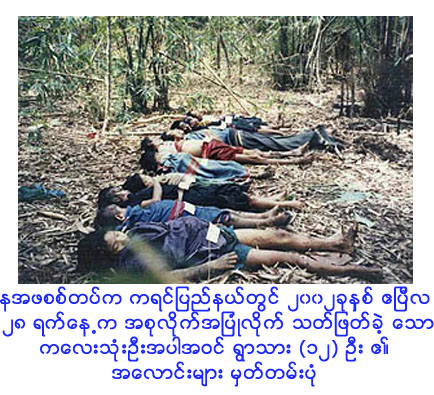The human rights situation in Myanmar continued to deteriorate, culminating in September when authorities staged a five-day crackdown on widespread protests that had begun six weeks earlier. The peaceful protests voiced both economic and political grievances. More than 100 people were believed to have been killed in the crackdown, and a similar number were the victims of enforced disappearance. Several thousands were detained in deplorable conditions. The government began prosecutions under anti-terrorism legislation against many protestors. International response to the crisis included a tightening of sanctions by Western countries. At least 1,150 additional political prisoners, some arrested decades ago, remained in detention.
A military offensive continued in northern Kayin State, with widespread and systematic violations of international human rights and humanitarian law. In western Rakhine State, the government continued negotiations on a large-scale Shwe gas pipeline, preparations for which included forced displacement and forced labour of ethnic communities.
Background
In September, the government completed drafting guidelines for a new Constitution, the second step in their seven-step “Road Map” for moving toward democracy. In December, the government appointed a 54-member commission of military and other officials to draft the Constitution. The National League for Democracy (NLD), the main opposition party, has not participated in this process since the early stages, and legislation criminalizing criticism of the process remained in place.
The government had ceasefires in place with the armies of all but three ethnic groups, but forced displacement, labour, and portering by the military continued in all seven ethnic states.
Following a visit by the Special Advisor to the UN Secretary-General on Myanmar, the Myanmar authorities met with Daw Aung San Suu Kyi toward starting dialogue on national reconciliation, but the NLD party leader remained under house arrest, where she has been for 12 of the past 18 years. read all
http://thereport.amnesty.org/eng/regions/asia-pacific/myanmar





You must be logged in to post a comment.